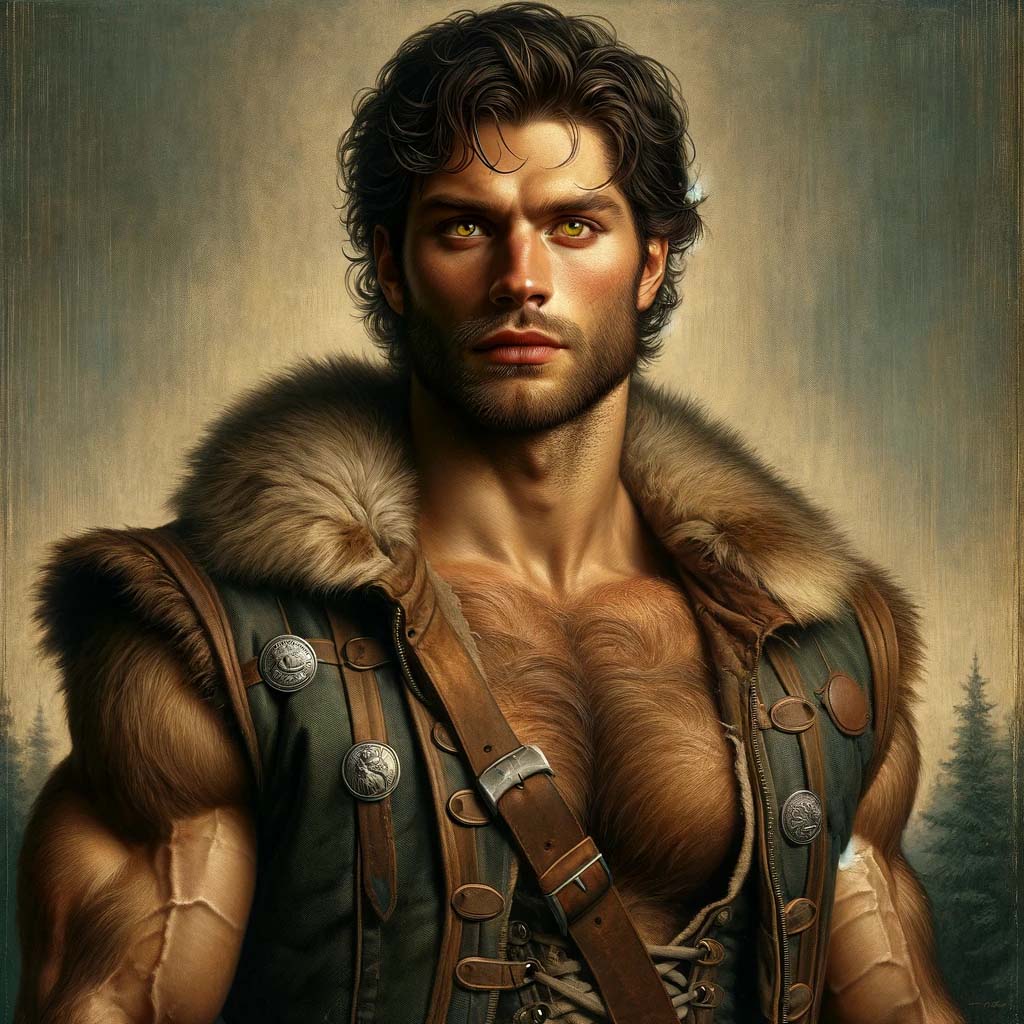
Snow lay thick upon the ground in the secluded village nestled within the embrace of the Carpathian Mountains. Mihai Lupu began his day before dawn had a chance to paint the sky with its light.
In the early hours, Mihai’s form, a silhouette against the snow, moved with purpose. His tall frame and broad shoulders were draped in a leather jacket he had crafted himself, its seams holding memories of his careful handiwork. His boots, worn and comfortable, each creak a testament to the miles they had traversed together through the wilderness.
The village was still asleep as Mihai ventured out, only the soft hoots of an owl piercing the silence. He trekked into the forest, where trees stood like ancient guardians. The crunch of his steps was the only sound disturbing the sacred quietude. His yellow eyes scanned the horizon with an innate alertness, reflecting back the faintest light—a remnant of his otherness.
He set traps with practiced hands, a ritual passed down from generations untold. The leather straps were firm yet gentle, designed not to harm but to hold. As he worked, his breath mingled with the crisp air, forming clouds that danced away into nothingness.
Returning home as hints of daylight began to emerge, Mihai entered the modest wooden house that had been his family’s for generations. His parents were already awake; his mother preparing a hearty breakfast while his father sat by the fire, carving wood into shapes that told stories of their lineage.
“Morning,” Mihai greeted them, his deep voice resonating within the small space.
His mother glanced over her shoulder and smiled. “Breakfast is almost ready. Go wash up.”
He nodded and splashed cold water on his face from a basin in the corner, chasing away remnants of sleep and wilderness. As he joined them at the table, he filled his plate with food that promised sustenance for another day’s labor.
His father looked up from his work, studying Mihai with eyes that held both pride and understanding. “The leather on your jacket is holding up well,” he commented. Mihai Beamed, he loved his fathers approval, and worked hard for it.
Mihai’s mother, Elena, carried the warmth of the hearth in her smile. Her hands, always busy with some task or another, were as much a part of the home as the walls that sheltered them. She moved with an effortless grace, weaving through her chores like a bird through the sky. Her hair, once raven-black and now streaked with silver, was often pulled back to reveal a face that had braved many winters yet retained the softness of spring.
Elena’s love for Mihai was a river that knew no end. It flowed through her every word and gesture—from the careful way she mended his clothes to the tender look that lingered in her eyes whenever they fell upon him. Yet beneath this current of affection ran a deep vein of worry. She understood the nature of her son’s dual existence better than anyone and feared what might become of him should he ever lose control.
Across from her sat Petru, Mihai’s father, whose presence was as solid as the mountains themselves. His face was carved from the same rugged landscape that surrounded them, weathered by storms and softened by moments of tranquility. His eyes held stories of a life intertwined with the forest and its creatures—a life he had imparted to his son.
Petru was a man of few words; his language was action and expectation. He had trained Mihai in the ways of leatherworking and survival with an exacting hand, demanding excellence and bestowing pride when it was due. He saw in Mihai not just his heir but also the embodiment of their family’s legacy—the living bridge between human and the supernatural realms.
The bond between father and son was forged from respect and mutual understanding. Mihai revered his father for his strength and wisdom while striving to exceed the silent benchmarks Petru set before him. In turn, Petru admired his son’s prowess and dedication, even if he seldom voiced it aloud.
After breakfast, he retreated to his workshop—a small annex attached to their home—where hides awaited transformation under his skilled hands. His tools were an extension of himself: awls sharp enough to pierce silence, needles threading stories through leather.
Mihai’s workshop was a testament to his worlds, the human, the lupine and the witch. The small, timber-framed space held an air of purposeful disarray. Tools of his trade adorned the walls, meticulously arranged on hooks and shelves made from branches of the surrounding forest. Sunlight streamed through a solitary window, illuminating particles of leather and wood dust that danced in the air like woodland sprites at play.
A sturdy workbench dominated the center of the room, scarred from years of use, each mark a story of creation. Bundles of leather in various stages of tanning were piled neatly in one corner, their earthy scent mingling with the resinous pine of the walls. Jars of natural dyes lined a shelf above the work area—russet, ochre, and deep forest green—colors drawn from nature itself.
Mihai moved with quiet confidence among his treasures. His fingers traced over the tools: knives honed to a fine edge, mallets worn smooth by his grip, needles that had pieced together not just garments but a reputation. He selected a hide with care, laying it upon his bench as if granting it a place of honor.
He was crafting a pair of boots, designed not for fashion but for function. They would serve a traveler well on long journeys across rugged terrains, protecting their feet from rock and root. The leather was supple yet strong, chosen for its ability to withstand the elements while offering comfort. Mihai worked the material with reverence, cutting and shaping each piece with an artisan’s precision.
As he stitched the sections together, his hands performed a dance they had known since boyhood—a rhythm passed down through bloodlines steeped in craft and tradition. Each loop of thread was a note in an ancient melody; each knot was a chorus echoing through generations.
On another part of his bench lay an array of silver amulets. They were not merely decorative; each bore symbols rooted in werewolf lore—a protective ward for those who understood their significance. The silver was cool to the touch and gleamed under Mihai’s steady gaze as he etched intricate patterns into their surfaces.
As he worked, he lost himself in rhythm; A knock at his door jolted him back to reality. He opened it to find Vasile, an elder whose silver hair mirrored amulets Mihai wore around his neck—reminders of vulnerability and strength alike.
“You have a moment?” Vasile asked with a gravity that settled in Mihai’s chest like stone.
Mihai stepped aside to let him in. “Of course.”
Vasile settled into the room, his presence commanding despite the humble surroundings. His cloak, rich and voluminous, seemed to swallow the light around him, while his eyes, dark and sharp, missed nothing. Mihai noticed the sealed parchment clutched in Vasile’s hand—a missive that undoubtedly carried weight.
“From the Witches Council,” Vasile began, offering the letter to Mihai. “They’ve made their decision.”
Mihai’s heart pounded a fierce rhythm against his ribs as he took the letter with a hand steadier than he felt. Breaking the wax seal imprinted with ancient symbols, he unfolded the parchment. The words within swirled before his eyes, each one a surge of possibility.
“The New World…” Mihai breathed out the words as if tasting them for the first time.
“You have been chosen,” Vasile confirmed with a nod. “Your unique heritage, your skills—they believe you will be invaluable in establishing our sanctuary across the ocean.”
Stunned silence enveloped the room like fog over the mountains. Mihai felt a rush of excitement coursing through him—a primal call to explore and conquer new territories. But this was no simple hunt; this was a journey into the unknown, where he might finally be free to reveal all facets of himself.
He looked up at Vasile, questions swirling in his mind like leaves in a tempest. “Why me?”
Vasile’s lips curved into a knowing smile. “You are of The Chosen Delegates, Mihai Lupu—Lupul Pădurii. Your connection to our land runs deep, but so does your need to find balance between your two natures.”
Mihai felt seen in a way he seldom did; Vasile understood not just his abilities but his innermost struggle. The New World could offer more than escape—it could offer acceptance.
“Think of it,” Vasile continued. “A place where you can roam without fear of persecution or misunderstanding—a fresh start for all of us.”
The weight of what was being offered settled upon Mihai’s shoulders like winter snow atop the mountain peaks. A chance to live openly, without shadows clinging to his every step, was more than he had ever dared to hope for.
His thoughts turned homeward—to his parents who had taught him everything: how to work leather, how to move through the forest unseen and unheard, how to embrace his heritage with pride yet caution.
With heart hammering against chest like drums in the night, Mihai made his way back to the main house where his parents were busying themselves with their daily tasks—his mother weaving baskets and his father still carving wood by the dying fire.
“Mama, Tata,” Mihai began, voice steady despite the tumult within him. They looked up at him with matching expressions of curiosity.
“I have been chosen by The Witches Council,” he said slowly, allowing each word its due weight. “They wish for me to travel to the New World—to represent our people and our traditions there.”
His mother’s hands stilled on her work as she processed his words; her eyes sought his face for some hint of jest. His father set down his carving knife with a soft clink against stone.
“To leave us?” His mother’s voice was a whisper—fragile as spider silk yet laden with emotion.
Mihai stepped closer, closing the distance between them. “It is an honor,” he explained gently. “A chance for new beginnings—for all our kind.”
His father stood then, broad-shouldered and stoic as ever. He approached Mihai and placed hands on his son’s shoulders—an anchor amidst swirling currents.
“You have always been destined for great things,” he said solemnly. “We’ve known that since you were born under that blood-red moon.”
Mihai felt a swell of love and gratitude for these two people who had shaped him into who he was—who had taught him how to wield both needle and claw with equal finesse.
His mother rose from her seat and joined them, her embrace encompassing them both—a fortress against uncertainty.
“When do you leave?” she asked after a moment spent in silence. Tears silently falling down her face.
“The ship sets sail from Amsterdam on Beltane next year,” Mihai replied. “I must prepare.”





